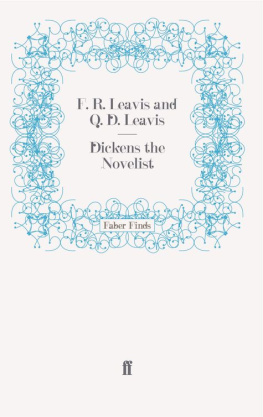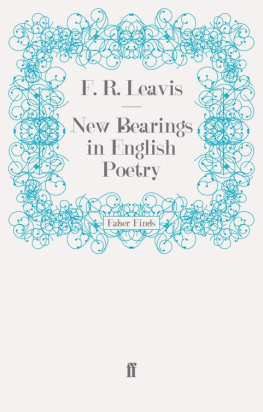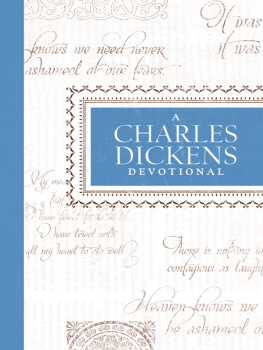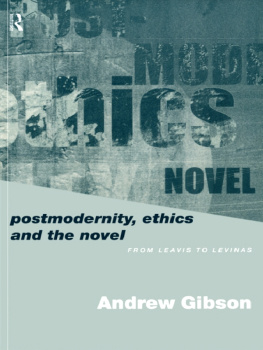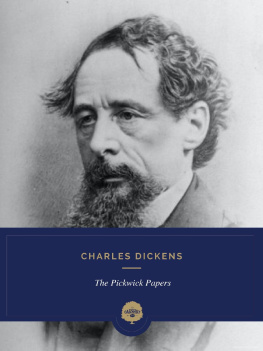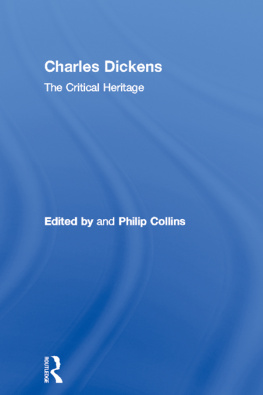We dedicate this book to each other as proof, along with Scrutiny (of which for twenty-one years we sustained the main burden and the responsibility), of forty years and more of daily collaboration in living, university teaching, discussion of literature and the social and cultural context from which literature is born, and above all, devotion to the fostering of that true respect for creative writing, creative minds and, English literature being in question, the English tradition, without which literary criticism can have no validity and no life.
I suppose so remarkable an author as Dickens hardly ever lived who carried so little of authorship into ordinary social intercourse Though Dickens bore outwardly so little of the impress of his writings, they formed the whole of that inner life which essentially constituted the man.
FORSTER , LifeofDickens
It always struck me they missed my little point with a perfection exactly as admirable when they patted me on the back as when they kicked me in the shins. By my little point I mean what shall I call it? the particular thing Ive written my books most for. Isnt there for every writer a particular thing of that sort, the thing that most makes him apply himself, the thing without the effort to achieve which he wouldnt write at all, the very passion of his passion, the part of the business in which, for him, the flame of art burns most intensely? The order, the form, the texture of my books will perhaps some day constitute for the initiated a complete representation of it. So its naturally the thing for the critic to look for.
HENRY JAMES , TheFigureintheCarpet
I have said that Dickens felt criticism, of whatever kind, with too sharp a relish for the indifference he assumed to it; but the secret was that he believed himself to be entitled to a higher tribute than he was always in the habit of receiving.
FORSTER , LifeofDickens
I T seems well to state clearly and briefly in front of this book what we offer to do in it. We have not undertaken a general survey of Dickens, believing that all such enterprises are merely academic, and unprofitable critically. Our purpose is to enforce as unanswerably as possible the conviction that Dickens was one of the greatest of creative writers; that with the intelligence inherent in creative genius, he developed a fully conscious devotion to his art, becoming as a popular and fecund, but yet profound, serious and wonderfully resourceful practising novelist, a master of it; and that, as such, he demands a critical attention he has not had. We should like to make it impossible for any academic authority to feel that, in doing assorted Dickens characters with histrionic gusto he pays the recognized appropriate tribute to the creative gift, or for any intellectual academic, journalist or both to tell us with the familiar easy assurance that Dickens of course was a genius, but that his line was entertainment, so that an account of his art that implies marked intellectual powers a capacity, for example , to read and understand Bentham is obviously absurd. We wish to make it impossible for such critics to assert, or assume, that any character from the novels of Dickenss maturity might have equally appeared in any other of the novels than the one in which it in fact functions as an inseparable part of the whole. And we have thought it essential to register specific protests against the trend of American criticism of Dickens, from Edmund Wilson onwards , as being in general wrong-headed, ill-informed in ways we have demonstrated, and essentially ignorant and misdirecting.
In this connection we should perhaps explain our preference for Forsters Life of Dickens as a source over modern, more correct biographies, whether British or, still less acceptable, American. The fact is that Forster, whatever his sins of omission, suppression, or alteration of some letters or documents to give himself greater importance in relation to Dickens in the eyes of his world, does give the only convincing representation of Dickens as the creator of the novels for those capable of reading them with critical perception and disinterestedness witness the quotations from Forsters Life in our Epigraphs. And Forster, with his intimate personal knowledge of his friend (a friendship which survived storms), gives us the sense, as no other biographer does or now can, of being in the same room as Dickens, and even, more important, of being really inward with Dickenss personality and character, and without being concerned to make out a case by interpreting his subject. The ineptness of scholars as literary critics is a notorious fact. Essential ignorance can consort with a great deal of scholarly industry in assembling irrelevant data, and misrepresentation with interpreting that so-called factual matter, owing to a more or less unconscious bias, and with insinuating, through critical stupidity, false assumptions about the subjects art, character, personality and history: the subject often becoming a victim. In these respects the older biographers are much the safest, and even, surprisingly, the most useful still, for they shared and understood the age of which they wrote. They are also less pretentious as critics, have no modern psychological jargon, and were more really knowledgeable in presenting their subjects, as well as more truly respectful and essentially more inward with them. George Eliots widower thus contrives to provide an intimate, indispensable and unsurpassed portrait of, and understanding of the inner life of, Miss Evans and G. H. Lewess consort, without Mary Anne-or Marian-ing her in an ineffectual attempt to achieve familiarity, such as we have met in recent biographies from which after all no such appreciation or clear portrait is obtainable. Thus for instance Professor Edgar Johnsons biography of Dickens cannot claim to have superseded or even to rival Forsters, or Professor Gordon Haights to be as illuminating a guide to George Eliot the novelist as John Crosss, while the biographical notices and memoirs of anyone who knew D. H. Lawrence and wrote of him without malice are undoubtedly to be preferred to Professor Harry T. Moores. The untenable position of those academics and journalists who are determined to explain away Dickenss creative uvre as the uncontrolled product of childhood obsessions or experiences, or of a psychological abnormality, or of a consistent lifelong exhibition of manias, is examined in a Note below.
The method we decided on was to take the six great novels as lending themselves peculiarly to the purpose when considered in relation to the development of Dickenss powers, and to discuss them each in terms of intrinsic interest but in chronological order and in reference to each other. The book was conceived as a book: the fact that a chapter is devoted to each of these novels doesnt reduce it to a collection of essays. The purpose is everywhere there as the informing spirit, determining approach and presentation, and the chronological order belongs to the sustained argument.
The fourth chapter, that on HardTimes, originally appeared in Scrutiny as inaugurating this approach to Dickens, and more generally to the Novel, as early as Spring 1947, being the initial essay in a series the title of which, The Novel as Dramatic Poem, conveyed the idea of the enterprise . Received at the time with ridicule, this title and this essay have since been accepted as marking a new approach both to Dickens (and effecting a revolution in Dickens criticism) and to the art of the novel generally. It was reprinted as something in the nature of an appendix to TheGreat

